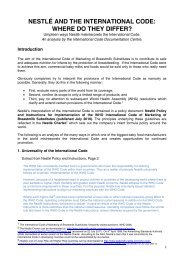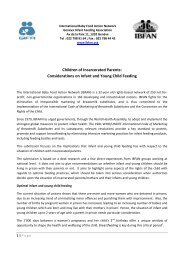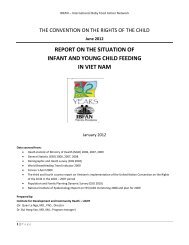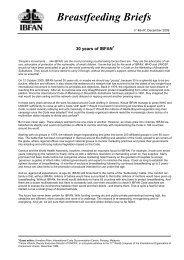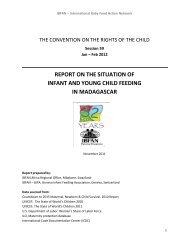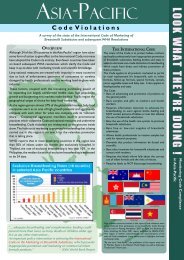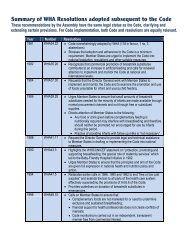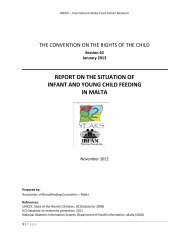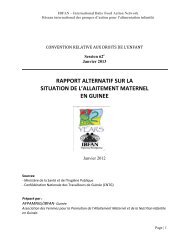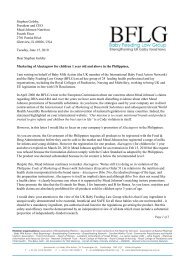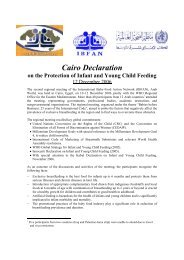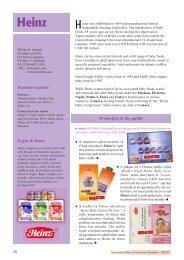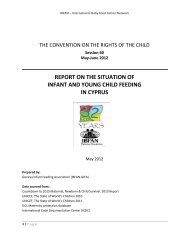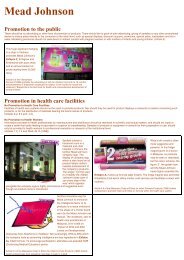Infant and young child feeding in emergencies. Making it ... - IBFAN
Infant and young child feeding in emergencies. Making it ... - IBFAN
Infant and young child feeding in emergencies. Making it ... - IBFAN
You also want an ePaper? Increase the reach of your titles
YUMPU automatically turns print PDFs into web optimized ePapers that Google loves.
Evaluation<br />
• One half-day is not sufficient to tra<strong>in</strong> commun<strong>it</strong>y<br />
counsellors adequately. They need a number of<br />
tra<strong>in</strong><strong>in</strong>g sessions, spread over time (to take <strong>in</strong>to<br />
account the acute emergency <strong>and</strong> their availabil<strong>it</strong>y).<br />
• The cascade system used <strong>in</strong> Indonesia <strong>and</strong> presented<br />
on Day 2 of the workshopwas referred to, as a useful<br />
model to <strong>in</strong>troduce.<br />
Observations on h<strong>and</strong>l<strong>in</strong>g of artificial <strong>feed<strong>in</strong>g</strong> <strong>in</strong><br />
<strong>emergencies</strong><br />
The feedback of the scenario plans showed that the<br />
major<strong>it</strong>y of groups had focused on tra<strong>in</strong><strong>in</strong>g to support<br />
breast<strong>feed<strong>in</strong>g</strong> <strong>in</strong>fants, even <strong>in</strong> the group whose scenario<br />
<strong>in</strong>cluded a significant proportion of non-breastfed <strong>in</strong>fants.<br />
Attention may have automatically focused on<br />
breast<strong>feed<strong>in</strong>g</strong> because artificial <strong>feed<strong>in</strong>g</strong> <strong>in</strong> <strong>emergencies</strong> is<br />
not considered a country ‘problem area’ by participants -<br />
as reflected <strong>in</strong> the Country Grid on Day 1. Moreover, the<br />
considerable problems w<strong>it</strong>h unsolic<strong>it</strong>ed donations of BMS<br />
<strong>in</strong> <strong>emergencies</strong> <strong>in</strong> the region <strong>and</strong> the surround<strong>in</strong>g<br />
discussions on avoid<strong>in</strong>g them <strong>and</strong> protect<strong>in</strong>g breastfed<br />
<strong>in</strong>fants may have distracted delegates from the fact that <strong>in</strong><br />
their countries, there are <strong>in</strong>fants who are not breastfed <strong>and</strong><br />
who, <strong>in</strong> an emergency, also need protection <strong>and</strong> support.<br />
7<br />
Evaluation<br />
<strong>and</strong> ‘Post-Mortem’<br />
of the Workshop<br />
An evaluation of Days 1-3 of the workshop was<br />
undertaken at the end of the third day through<br />
a questionnaire to all participants 32 . Given the<br />
different objectives <strong>and</strong> format of Day 4, a<br />
separate evaluation was carried out at the end of Day 4.<br />
7.1 Evaluation Days 1-3<br />
The major<strong>it</strong>y of participants attend<strong>in</strong>g on the third day<br />
completed the evaluation <strong>and</strong> the comments were<br />
generally very pos<strong>it</strong>ive. For example, 38 out of 43<br />
respondents felt that the workshop “built awareness of the<br />
importance of IFE <strong>and</strong> promoted implementation of the<br />
Operational Guidance on IFE” <strong>and</strong> 40 said they felt their<br />
work on IFE would def<strong>in</strong><strong>it</strong>ely or partially be improved as<br />
a result of the workshop.<br />
Just over half of the respondents had read the<br />
Operational Guidance on IFE before com<strong>in</strong>g to the<br />
workshop <strong>and</strong> about the same number said they had used<br />
<strong>it</strong> to guide their work <strong>in</strong> <strong>emergencies</strong>. In response to the<br />
question “Are there any issues which are not covered by<br />
the Operational Guidance on IFE?” respondents wanted<br />
more on complementary <strong>feed<strong>in</strong>g</strong>, food divers<strong>it</strong>y <strong>and</strong><br />
maternal/caregiver <strong>feed<strong>in</strong>g</strong>, reference to f<strong>in</strong>ancial<br />
resources needed <strong>and</strong> estimations of cost for different<br />
<strong>in</strong>terventions. Participants also wanted more on how to<br />
h<strong>and</strong>le the media, how to <strong>in</strong>corporate IFE <strong>in</strong>to pre-service<br />
curriculum of health care providers, matrices for<br />
assessment <strong>and</strong> mon<strong>it</strong>or<strong>in</strong>g, <strong>and</strong> a template for report<strong>in</strong>g<br />
<strong>and</strong> record<strong>in</strong>g.<br />
Participants seem to have found all of the sessions of<br />
the workshop useful or would have liked to have more<br />
detailed discussion. In particular, participants found the<br />
policy guidance <strong>and</strong> coord<strong>in</strong>ation session useful <strong>and</strong><br />
many people would have liked to have had more time to<br />
discus challenges of IFE assessment. Participants<br />
<strong>in</strong>dicated they would have liked to have sessions <strong>in</strong>cluded<br />
<strong>in</strong> the workshop on the follow<strong>in</strong>g: more on<br />
complementary <strong>feed<strong>in</strong>g</strong>, budget<strong>in</strong>g for IFE <strong>and</strong> costsaved/cost-benef<strong>it</strong><br />
analyses, management of severe acute<br />
malnutr<strong>it</strong>ion, non-breastfed <strong>in</strong>fants, management of HIVnegative<br />
<strong>in</strong>fants, <strong>and</strong> IFE <strong>in</strong>tegration w<strong>it</strong>h other sectors.<br />
In terms of actual presentations, many people found<br />
the presentations on the International Code <strong>and</strong> the<br />
Philipp<strong>in</strong>es Code experience useful. The Philipp<strong>in</strong>es<br />
presentation on how to avoid donations was also very<br />
much appreciated, as was the presentation on ‘Where IFE<br />
s<strong>it</strong>s <strong>in</strong> <strong>in</strong>ternational policies’, the communications<br />
presentations, field experiences of IFE assessment <strong>and</strong><br />
regional experiences.<br />
The work<strong>in</strong>g groups of Day 3 also appear to have been<br />
helpful; most respondents felt the morn<strong>in</strong>g thematic<br />
work<strong>in</strong>g group helped consolidate ideas on the themes<br />
<strong>and</strong> also used the conclusions of the thematic work<strong>in</strong>g<br />
groups <strong>in</strong> their Country work<strong>in</strong>g groups <strong>in</strong> the afternoon.<br />
Half of the respondents felt their country work<strong>in</strong>g group<br />
plans were “good <strong>and</strong> believed <strong>it</strong> would be implemented”<br />
while the other half felt the “plans were good but were not<br />
sure they would be implemented” or were “good but<br />
needed to be developed further w<strong>it</strong>h other stakeholders”.<br />
32<br />
The Indonesian representation of 40 participants for Days 1 <strong>and</strong> 2<br />
was reduced to 23 delegates on Day 3 to facil<strong>it</strong>ate the work<strong>in</strong>g<br />
groups <strong>and</strong> to three participants on Day 4, by prior agreement<br />
w<strong>it</strong>h participants.<br />
21



